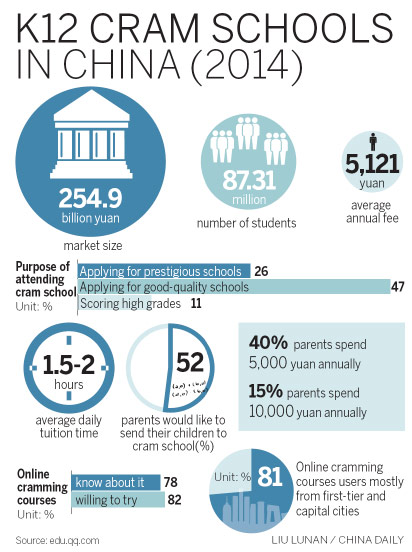
"Every student will take an entrance exam before the organization decides which level of class he or she should attend," Chen Mingyou, an educational consultant at Xueda Shanghai, said.
"If students cannot attain the results which parents expect, Xueda will refund some of the tuition fees."
But this policy has come under fire from certain parents. In 2012, Xinhua news agency reported that the company's after-school classes in Chongqing and Wuhan in Hubei province did not provide the courses or the teachers they advertised.
Parents also complained that they were overcharged. When asked to comment on this, Xueda pointed out it had conducted an investigation into the matter without going into details.
The company's stock price has reflected those concerns. Xueda opened at $14.3 when it was first listed in 2010. Five years later, it is now around $5, despite rumors in July that the company could go private again.
Major shareholder Xiamen Insight Investment Co Ltd have been involved in merger talks. But as it stands, Xueda is likely to raise additional investment from the market to solve rising costs in its one-on-one teaching model.
"Xueda has started to make a shift from offline to online education since last year," Wang Yin, board secretary at Insight Investment, said. "It has also been diversifying from one-on-one courses to bigger classes."
But Xueda is not the only educational company facing challenges.
Data released in April by the Shanghai Consumer Council revealed that a total of 1,968 complaints were made against educational services last year, a rise of 57.8 percent compared to the same period in 2013.
Figures also showed that the educational sector was in the top six industries where compliants were frequent along with online sales, pre-paid shopping cards, tourism, insurance and automobiles.
Incessant marketing calls and abuse of personal data were singled out as the main problems.
About 78 percent of those surveyed by the Shanghai Consumer Council said their private details had been disclosed. Around 38 percent reported that they had been bombarded by promotional calls.
Contract disputes were also a major concern although this was reflected more in the adult education market. About 30 percent of those polled said their tutor had changed in the middle of a course.
Many also complained about confusing advertising, the arbitrary adjustment of courses, changes in location, refund problems and schools closing.
Tang Jiansheng, deputy secretary-general of the Shanghai Consumer Council, expressed concern about the question of refunds.
"The institutions only eye the number of students and profit," Tang said. "They have never really taken into account the students' proficiency or economic affordability. Whenever there is a problem, they simply become deaf and blind.
"The educational training industry lacks standard regulations," he added. "Related industry association should work on this to make sure consumers are protected."


















































